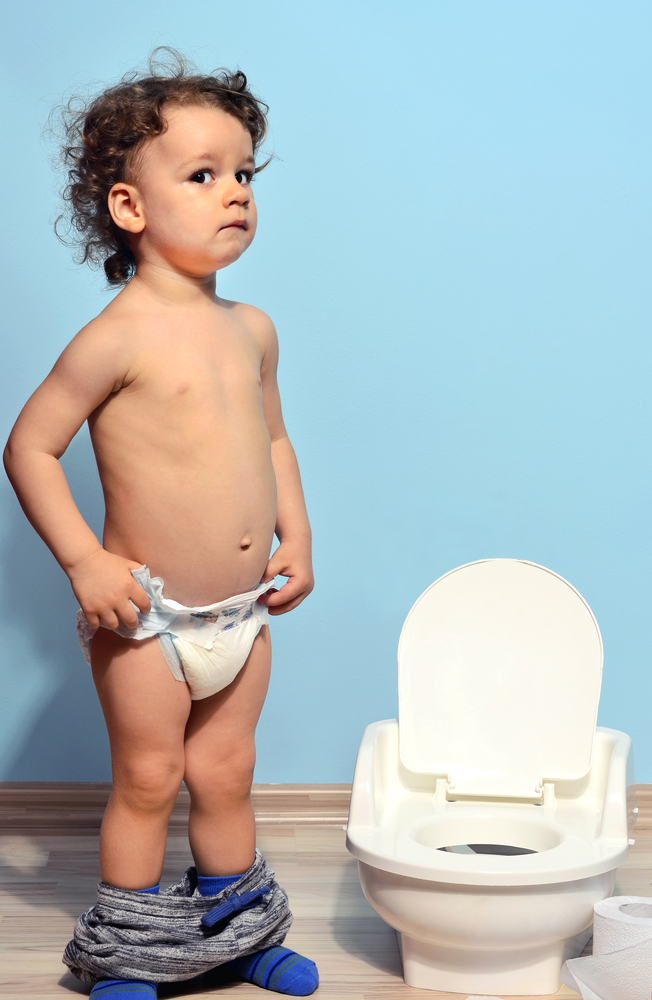Potty Training – Get Ready, Get Set, Go!
Get Ready If your child is near or has passed his first birthday, you can begin incorporating pre-potty training ideas into his life. They are simple things that will lay the groundwork for potty training and will make the process much easier when you’re ready to begin.
- During diaper changes, narrate the process to teach your toddler the words and meanings for bathroom-related functions, such as pee-pee and poo-poo. Include descriptive words that you’ll use during the process, such as wet, dry, wipe, and wash.
- If you’re comfortable with it, bring your child with you when you use the toilet. Explain what you’re doing. Tell him that when he gets bigger, he’ll put his pee-pee and poo-poo in the toilet instead of in his diaper. Let him flush the toilet if he wants to.
- Help your toddler identify what’s happening when she wets or fills her diaper. Tell her, “You’re going poo-poo in your diaper.” Have her watch you dump and flush.
- Start giving your child simple directions and help him to follow them. For example, ask him to get a toy from another room or to put the spoon in the dishwasher.
- Encourage your child to do things on her own: put on her socks, pull up her pants, carry a cup to the sink, or fetch a book.
- Have a daily sit-and-read time together.
- Take the readiness quiz again every month or two to see if you’re ready to move on to active potty learning.
Get Set
- Buy a potty chair, a dozen pairs of training pants, four or more elastic-waist pants or shorts, and a supply of pull-up diapers or disposables with a feel-the-wetness sensation liner.
- Put the potty in the bathroom, and tell your child what it’s for.
- Read books about going potty to your child.
- Let your child practice just sitting on the potty without expecting a deposit.
Go
- Begin dressing your child in training pants or pull-up diapers.
- Create a potty routine–have your child sit on the potty when she first wakes up, after meals, before getting in the car, and before bed.
- If your child looks like she needs to go–tell, don’t ask! Say, “Let’s go to the potty.”
- Boys and girls both can learn sitting down. Teach your son to hold his penis down. He can learn to stand when he’s tall enough to reach.
- Your child must relax to go: read a book, tell a story, sing, or talk about the day.
- Make hand washing a fun part of the routine. Keep a step stool by the sink, and have colorful, child-friendly soap available.
- Praise her when she goes!
- Expect accidents, and clean them up calmly.
- Matter-of-factly use diapers or pull-ups for naps and bedtime.
- Either cover the car seat or use pull-ups or diapers for car trips.
- Visit new bathrooms frequently when away from home.
- Be patient! It will take three to twelve months for your child to be an independent toileter.
Stop
- If your child has temper tantrums or sheds tears over potty training, or if you find yourself getting angry, then stop training. Review your training plan and then try again, using a slightly different approach if necessary, in a month or two.
This article is an excerpt from The No-Cry Potty Training Solution: Gentle Ways to Help Your Child Say Good-Bye to Diapers by Elizabeth Pantley. (McGraw-Hill, 2006)
You are welcome to reprint this article on your website or in your newspaper or newsletter, provided that you reprint the entire article, including the complete byline with author’s name and book title. Please also send a link or copy to elizabeth@pantley.com. Thank you.
This handout is provided by Parent Trust for Washington Children. All information in this handout is provided by the copyright holder Elizabeth Pantley, who is solely responsible for it’s accuracy and content.

